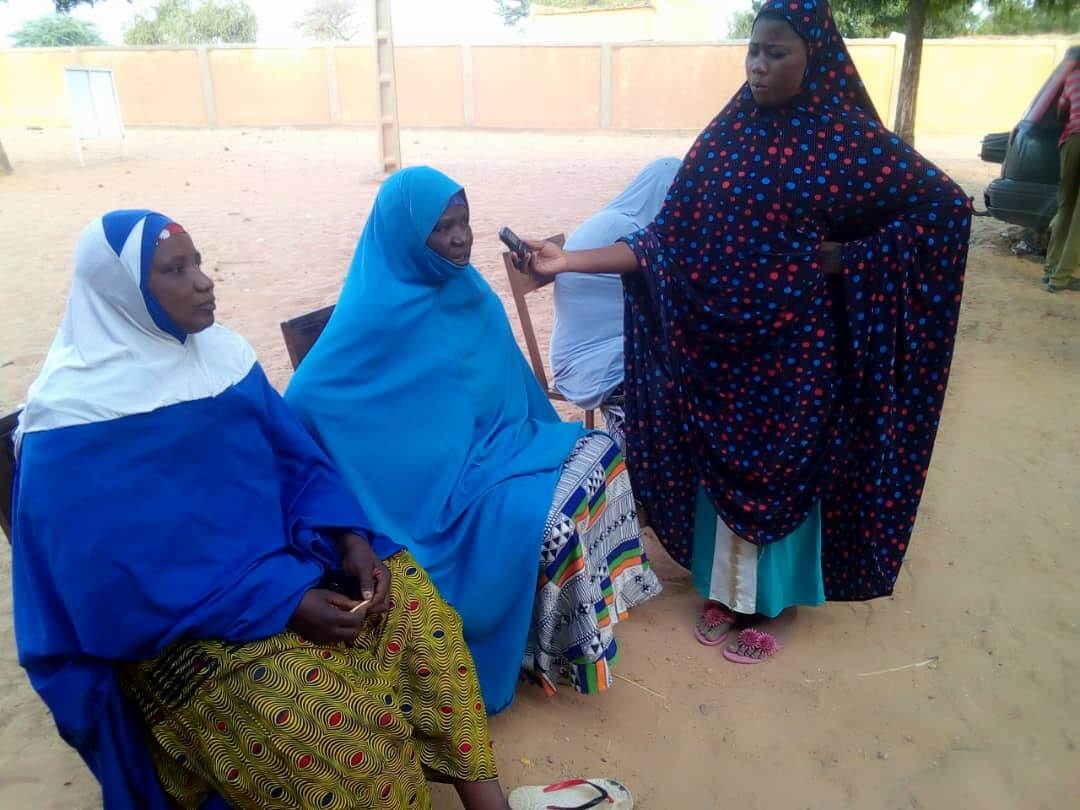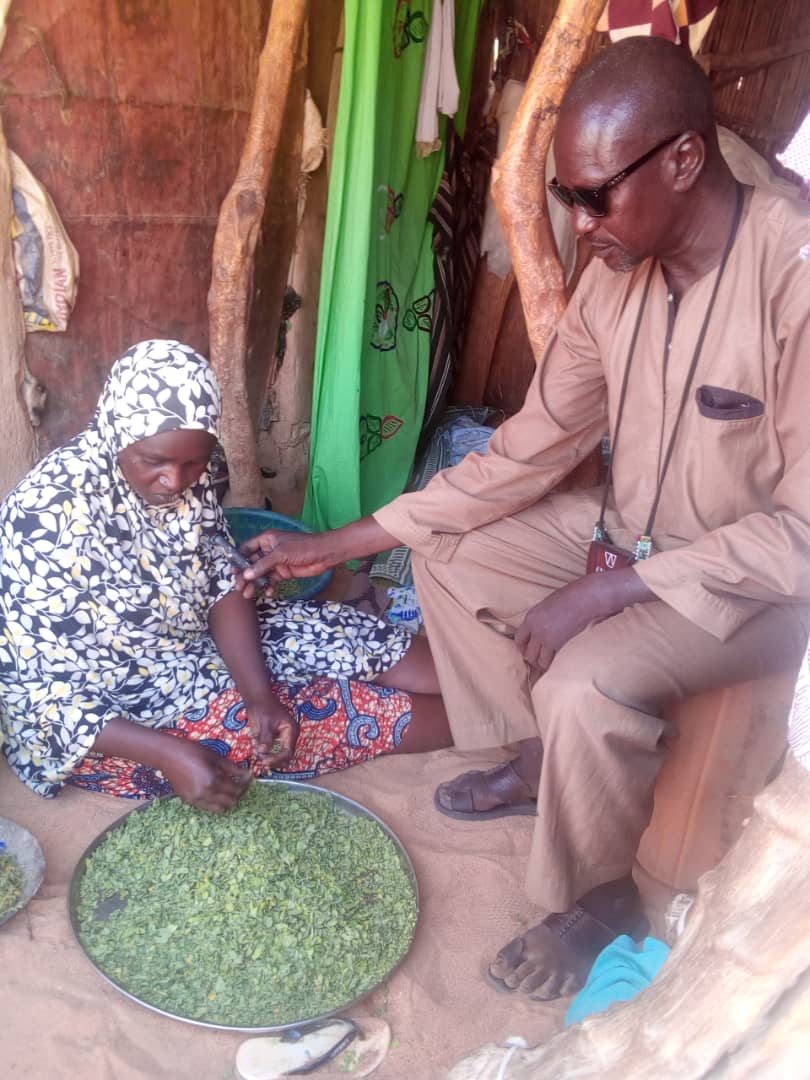
Radio Kourmey programmes cover themes related to rural development, environmental and health issues and the inclusion of women. Photo: Tahirou Boukari
How radio changes lives
Rural citizens in conflict-torn Western Niger get their news and information – including on gender and climate issues – from local community radio stations. Running one of them was a childhood dream for 51 year-old Tahirou Boukari
For more than a decade, the population of the border zone between Burkina Faso, Mali and Niger, known as the Liptako Gourma region, has been affected by conflicts. Armed groups fight for the scarce arable land, water and resources, and many have lost their lives at the hand of jihadists and other armed groups, causing the displacement of hundreds of thousands of people. In this environment, a number of local community radio stations have managed to reach large audiences with vital news.
“Working in the radio is a dream come true for me,” says Tahirou Boukari, who has spent almost two decades as the director of Radio Kourmey, which broadcasts a mix of practical news to rural citizens, farmers and pastoralists.
When Tahirou Boukari was a child, his family gathered around the radio, which broadcasted on shortwave and ran sports and news.
“The programme broadcasts were like magic for the children of my village. We didn’t know the names of the journalists, but we imagined their faces and they were heroes to us,” he says. “So, when I had the chance to join the team of the Kourmey radio station in Kokorou, which is also my native village, it was like a dream come true.”
Improved skills, improved programming
Today the radio station has a much broader reach and covers themes related to rural development, environmental and health issues, as well as the inclusion of women.
“For years, we successfully reached some people and performed a much-needed community service, but our lack of training and knowledge of radio production meant that we were limited. The quality of our programmes was not as good as it is today. This has changed since 2018, thanks to the Sahel programme implemented by IMS. We benefit from support in training, materials and financial support,” he says.
Two men and five women volunteer at the radio station. The staff who have learned the basic principles of radio production, including the design and structure of various genres and programmes, how to conduct interviews and editing, mixing and broadcasting. Moreover, the radio station is now equipped with computers, software and other equipment, including microphones, headsets, digital recorders, USBs and listening devices, which represent a golden opportunity to learn how to develop and edit professional radio programmes.
“We have experienced a revolution of high-quality content that has had a strong impact on listeners through formats such as debates, women’s listening club programmes and youth debates. All of this has been a great advancement for us because at the start we ran a lot of pre-packaged programmes produced by third parties,” Tahirou Boukari says.
“All these radio programmes [produced with IMS support] relate to various subjects with a strong impact on the daily life of the whole community. We can cite, for example, themes on the Sustainable Development Goals (SDGs), social cohesion, peacebuilding, human rights, rural development, the environment, community resilience in the face of development challenges, the inclusion of women and young people, etc.”
Tahirou Boukari’s colleague, Maka Doudou, the programme leader of the women’s listening club, adds:
“Our voices are being heard thanks to the training and support we have received. Women have traditionally been marginalised within our communities but, thanks to the various forms of capacity building, we have become key actors of inclusion within our communities,” she says.
“Beyond learning about production, we have managed to produce programmes that really help women, their health and their families. For instance, we have created shows related to prenatal care and women’s health,” she said, referring to one of the strategies of the IMS programme, namely to have the radio stations propose topics and have IMS provide professional and technical advice and financial support.


Promoting change
According to Maka Doudou, attendance at the health centre by women was very low before the IMS Sahel programme partnered with the radio station and the women’s clubs. But after the broadcast of the programme, everyone understood the importance of pregnant women going to and consulting with a healthcare worker before her delivery.
“Childbirth is just one example among many. That radio show has really shaped and changed the mentality of women and men in our region,” she says of a region with high rates of infant and maternal mortality.
The security crisis is very serious in Liptako-Gourma and thousands of people have been displaced from their villages, fleeing to safer places or camps for displaced people. The humanitarian situation is extremely critical. But Tahirou Boukari and Maka Doudou continue their work.
“Even with all these difficulties, we broadcast. And we use the techniques of conflict sensitive reporting and broadcasting of crucial information in the community that IMS taught us,” says Maka Doudou. It is part of the training and support from IMS to assess possible threats for both the individual and the radio station.
“Today our radio station participates in the enlargement of the public space of freedom of expression and all kinds of professional experts participate in the public debates which engage the life of the entire community. While we have worked with IMS, we have been able to develop more than 90 high quality programmes, of which we still broadcast some of them,” adds Tahirou Boukari.
Mobilising community for the environment
Environmental programmes have also been key. “Once we featured the case of the local pond [water reserve] of our community, which is drying up because of global warming. This was a problem because the residents had not developed agricultural activities to deal with this [some plants protect the water from fast evaporation]. The objective of choosing this theme was to mobilise the community to save the water reserve and promote agricultural activities on the banks,” he says.
The programme was widely listened to, and the plan worked, according to Tahirou Boukari.
“When we produced the programme on the diagnosis of the pond [water reserve], we proposed solutions to stop it drying up and we invited the population to practice agricultural activities to improve food and nutritional security. Especially with the interventions of locally elected officials, community leaders, representatives of women and young people, as well as rural development agents in the programme, a community synergy has been created around the problem. There are now local solutions to save the pond, and the town hall has supported women and young people with seeds and other gardening equipment to exploit the banks of the pond. This means that the local population has been able to set up agricultural perimeters for the cultivation of lettuce and other sorts [of vegetables]. Today, thanks to this programme, several members of our community are sheltered from poverty with the practice of agricultural activities around the pond,” he says.
This article was published in IMS’ Annual Report 2021




